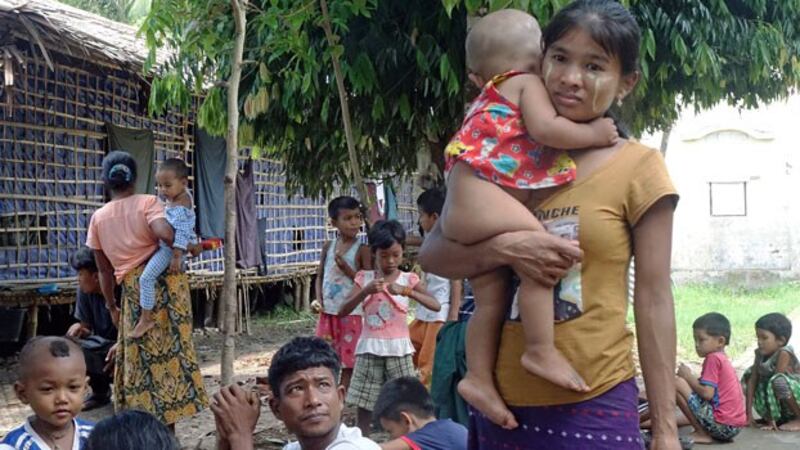UPDATED at 6:27 P.M. ET on 2020-07-01
The Myanmar army reversed plans to empty dozens of villages in northern Rakhine state to pursue rebel fighters after criticism from Western diplomats over the weekend, but a local lawmaker said Monday that more than 10,000 civilians had fled their homes as reports of artillery fire raised fears of an attack.
Local officials in northern Rakhine state told RFA’s Myanmar Service on Friday that the government military had ordered a village tract of 17 communities housing some 10,000 people in northern Rathedaung township emptied for “clearance operations” against the Arakan Army (AA).
Rathedaung township administrator Aung Myint Thein said in an earlier report that Colonel Min Than, Rakhine state’s border affairs and security minister, notified him on June 23 to inform all residents of the Kyauktan village tract to clear out so Myanmar forces could begin their sweep.
Rathedaung is one of several townships in northern Rakhine state where an 18-month-old conflict has killed about 260 civilians and displaced about 160,000 others.
On Sunday, Min Than told RFA that he revoked the order on June 26 because of “exaggerations” of the term “clearance operations,” though he did not elaborate.
Min Than spoke to RFA a day after the Myanmar missions of Australia, Britain, Canada, and the United States issued a statement expressing concern over reports of the military’s planned clearance operations in the Kyauktan village tract and the worsening overall humanitarian and security situation in the conflict zone.
“The fleeing of villagers along the Kyauktan village tract will further contribute to Rakhine’s already significant and increasing internally displaced population,” the statement said.
The United Nations issued a statement Sunday expressing concern about the armed conflict and called on combatants to allow humanitarian access.
Word of the army’s reversal did not reach people in the Kyauktan village tract and surrounding areas in time, said Khin Maung Latt, a Rakhine lawmaker in Myanmar’s upper house of parliament.
The villagers are “already fleeing as there are military activities in the area — artillery shells are falling and exploding in the area,” he told RFA.
“More than 10,000 people from 20-some villages have fled. In addition to those villagers, some people from Rathedaung and villages near Sittwe and Buthidaung are also fleeing.”
“People are fearful,” said Khin Maung Latt. “They are still fleeing.”
RFA was unable to reach local officials for comment.
IDP camps full in Rathedaung
Myanmar and AA forces have been engaged in intensified hostilities during the past year and a half, with the rebel army fighting for greater autonomy for Buddhist Rakhines in the state, where it runs several townships.
Khin Hsan Htay from Rathedaung’s Yay Myat village said she fled to the state capital Sittwe to escape firing in the direction of her community and artillery explosions on houses.
“We fled to another village, [but] that village was also fired upon, so we fled to Sittwe because we knew we would be safe only here,” she told RFA. “Now, we have taken shelter in a displacement camp at a Buddhist monastery.”
A volunteer helping displaced civilians, who gave his name as Bekka, said many villagers who fled the Kyauktan village tract have been sent to Sittwe because the 18 temporary camps in Rathedaung town are full.
“After authorities issued the announcement about the upcoming military operation, three more camps opened temporarily, [but] they are now full,” he said.
RFA contacted the International Committee of the Red Cross to find out how the organization is helping displaced civilians from Rathedaung, but received no response.

Human rights violations
Khin Saw Wai, a lawmaker from Rathedaung township, said local humanitarian groups and donors are providing some food supplies and accommodations for internally displaced persons (IDPs), but they have not yet received any help from the government.
She said it was not safe yet for people who fled by car, truck, or boat to return home.
“If there are no battles and the conditions are safe for them to return, then they will come home,” the lawmaker said.
Rakhine state municipal affairs minister and spokesman Win Myint said the government had not received any applications for assistance for the IDPs from Rathedaung township, though officials are ready to help.
In the meantime, the Myanmar military should make efforts to staunch the flow of IDPs, a local NGO worker said.
“To stop local civilians from fleeing their homes, it is important to address their fears,” said Zaw Zaw Tun, secretary of the Rakhine Ethnics Congress (REC). “The military should act consistently with its announcements once it withdrew the first one.”
“People are still fleeing despite the withdrawal of the first announcement, so the military operations should end according to the pledge,” he said.
Nickey Diamond, a Myanmar human rights specialist with the Southeast Asia-based NGO Fortify Rights, said targeting civilians will make matters worse for the Myanmar military, which faces legal action on genocide-related charges at the International Court of Justice (ICJ) and other legal action at the International Criminal Court (ICC) for its 2017 crackdown on Rohingya communities.
“Now, the new clearance operations targeting the civilians are also human rights violations,” he said.
“If the Myanmar military continues to commit human rights violations, it will be more challenging to defend itself at the ICJ and ICC or other U.N.-mandated court trials in the future,” he said.
Reported by RFA’s Myanmar Service. Translated by Ye Kaung Ming Maung. Written in English by Roseanne Gerin.
CORRECTION: An earlier version of this report incorrectly state that Colonel Min Than notified Ratheduang township administrator Aung Myint Thein on June 25. He notified him on June 23.

